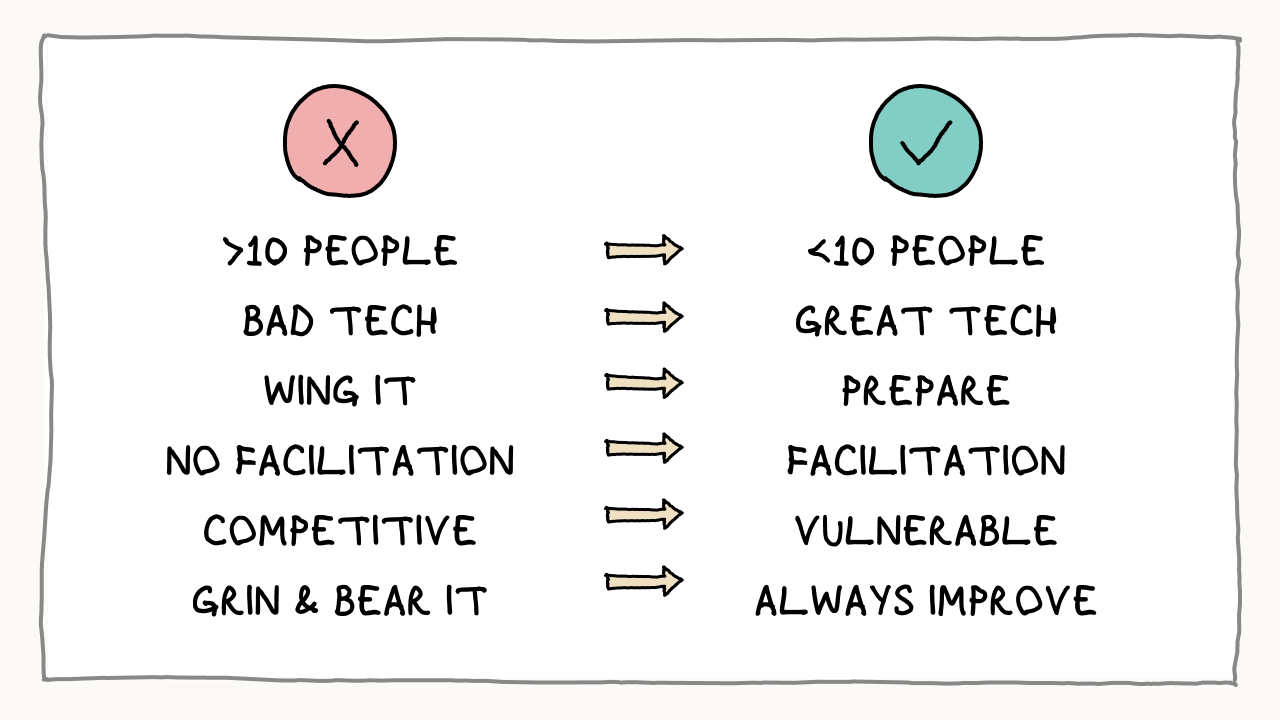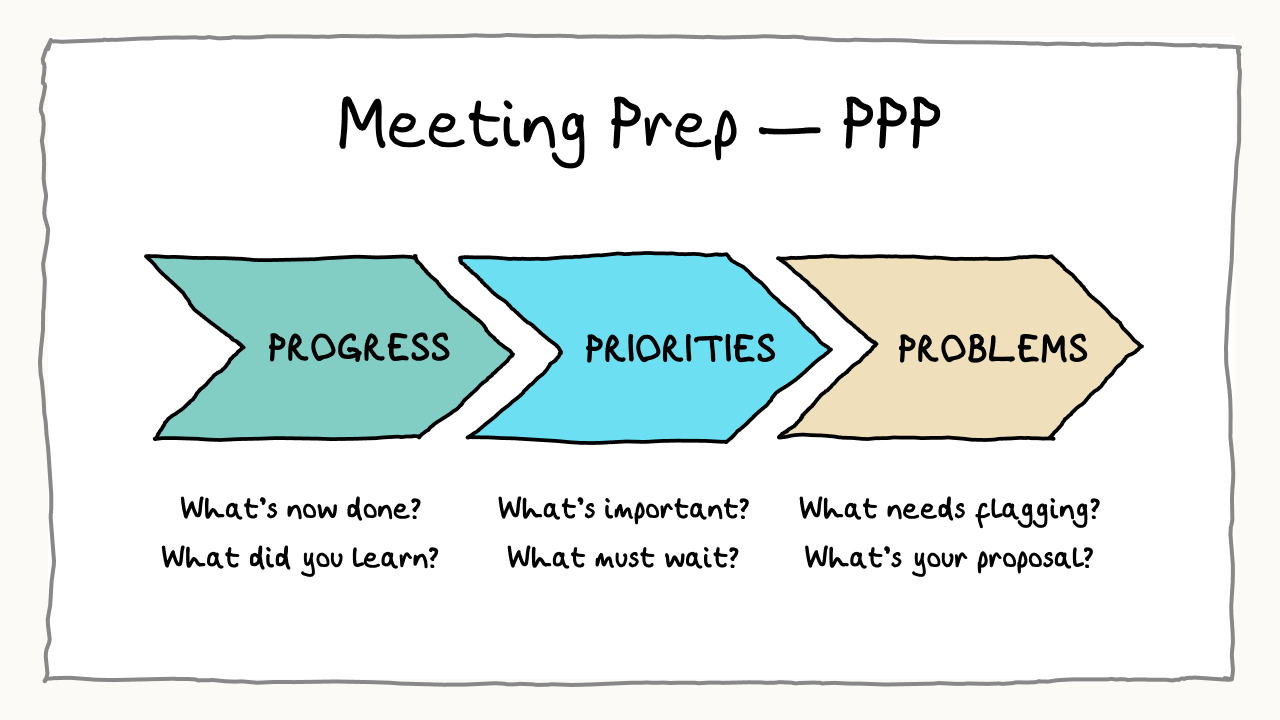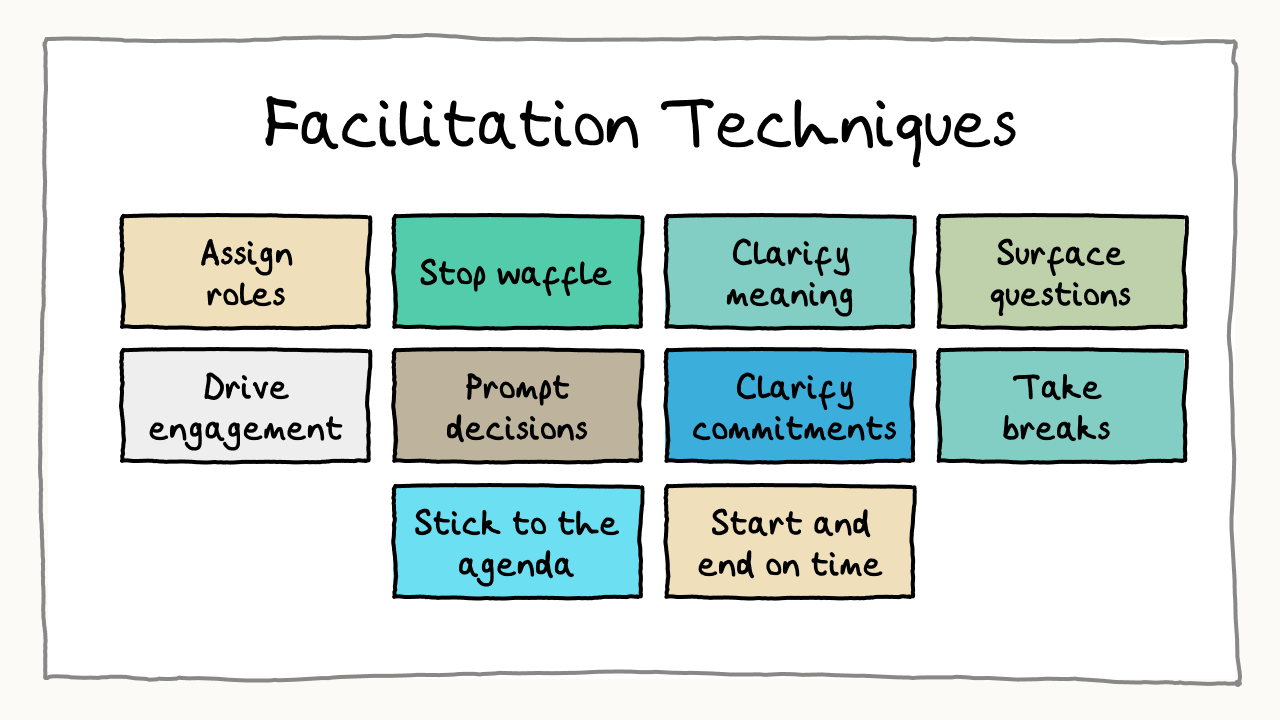Six Ways to Improve Your Management Meetings
Written by Dave Bailey
Your management meeting is one of the most expensive regular meetings in your business. Here’s how to make it one of your most valuable.
Earlier this year, I started observing the management meetings of some of my fastest-growing CEOs.
The companies they lead range from 50 to 500 employees—but each of the CEOs had similar concerns about their meetings:
- “They feel superficial”
- “My managers don't engage or challenge each other enough”
- “I leave feeling anxious, with more questions than answers”
After each meeting, I played back my observations to the CEO, along with suggestions to improve engagement and effectiveness. Surprisingly, the same issues came up again and again.
Here are six of the most common opportunities that might apply to your management meetings.

1) Reduce the number of attendees (for depth)
As your company grows, it’s typical for your management meeting to grow with it. During my observations, I attended management meetings with up to 20 managers… and they were as unengaging as they sound (even the CEO agreed!).
There’s a clear incentive to invite more people—you don’t have to fill them in later. However, the longer the attendee list, the lower your ability to go beyond superficial updates and hold people accountable.
If you have more than eight managers, it might be time to ask some hard questions:
- What is the goal of this meeting?
- What is the minimal viable audience to achieve it?
- Which execs may need to step out?
Asking certain managers to step out could feel uncomfortable—particularly as they may take this personally. But this isn’t a reason to avoid it. Speak to each one candidly and compassionately, communicate to the wider team, and work out how they will stay in the loop.
Learn new skills every week ->
2) Improve your tech (for engagement)
International teams and new expectations about work mean that hybrid meetings—with some attendees in the room and others joining remotely—are here to stay. Yet it’s easy to underestimate the importance of a good tech setup.
Do any of these situations sound familiar?
- Managers all in one room, but only one laptop with audio on
- Managers in one room with separate laptop filming the group
- Managers in the office joining remotely from separate rooms (what’s the point?)
Without the right kit, you're stuck with bad audio or everyone joining remotely, despite being in the same building.
If you consider the cost of a manager's time plus the value of a productive meeting, investing in better technology can prove to be a wise decision. Check out table and mounted cameras from Meeting Owl, Logitech Sight, and Huddly.
Similarly, blurry webcams and messy bedrooms may have been acceptable during the Covid lockdowns, but that’s not a reason to live with them going forward. A good home office setup for remote employees is a no brainer.
3) Ask attendees to prepare (for relevance)

The primary value of a meeting often takes place before the meeting starts.
Preparing for a meeting isn’t merely admin… it’s often the most important work involved in any meeting.
Consider your board meetings… what generates more value? The insights and clarity that come from writing the board pack and framing the discussion, or the discussion itself? 99 times out of 100, the prep is the payoff.
Leaders who prepare well are likely to waffle less and take more ownership. Lack of time is not an excuse to wing it.
Amazon asks executives to prepare memos in Google Docs which are reviewed in silence by everyone at the start of the meeting. Not only does this ‘silent meeting’ ensure adequate prep, it also guarantees the prep is actually read.
If this is too heavy-handed, ask each manager to prepare a ‘PPP’ before the meeting:
- Progress: What’s now done? What did you learn?
- Priorities: What’s the next big result? What must wait?
- Problems: What needs flagging? What’s your proposal?
This format can ensure people adopt a growth mindset, stay focused on results, and ask for the help they need.
4) Have a facilitation plan (for clarity)

The word facilitation comes from the Latin word for word ‘easy’. A facilitator’s job is to make the management meeting easier. Initially, a founder often facilitates (runs) the meeting, but as the company grows this role may fall to the COO or Chief of Staff.
A strong facilitator should:
- Assign roles: “Who’s taking notes?”
- Stop waffle: “What’s the bottom line?”
- Clarify meaning: “Explain it like we’re toddlers.”
- Surface questions: “What question aren’t we asking?”
- Drive engagement: “Gemma, what’s your perspective?”
- Prompt decisions: “You need to make a decision.”
- Clarify commitments: “What will you commit to by next time?”
- Set up breaks: “It’s time for a five-minute break… see you at 10:50.”
- Stick to the agenda: “Let’s park this and refocus on the agenda.”
- Start and end on time: “ELMO… enough, let’s move on.”
One common question I’d often hear was “how are you getting on?”
This encourages people to launch a monologue and provide a lot of irrelevant detail. Asking a more specific question often leads to a clearer and more concise answer:
- “What’s the most important thing you achieved last week?”
- “What are your key priorities this week?”
And here’s my favourite question to ‘end strong’:
“What will you commit to doing by our next meeting?”
5) Normalise vulnerability (for support)
If you want to optimise for transparency, collaboration and team spirit, you need teammates to feel comfortable sharing their challenges and setbacks.
Here, I noticed a couple of interesting things. Firstly, meetings that started by sharing ‘wins’ often showed competitive behaviour. And when people are trying to be ‘the best’, they are less likely to show vulnerability.
Switching from sharing wins to sharing praise—“how did another team member help you last week?”—switched the focus to collaboration while still highlighting things that went well.
- “I closed the Nike deal” (competitive)
- “Anika sent me some useful resources that helped me close the Nike deal” (praise)
Secondly, the meetings of teams who recently had a team offsite tended to be notably more supportive.
Investing in team building really does seem to have a positive impact on a team’s ability to get results. Of course, you don’t need an offsite to run a team building workshop. Organising a team lunch can provide a chance to catch up and build context outside the office.
Learn new skills every week ->
6) Get participant feedback (for improvement)
I was surprised that none of the meetings I attended had a regular feedback mechanism. To me, that’s a mistake—this can often be a quick win.
At the end of the meeting, ask each attendee to fill out a simple two-question survey on Google Forms:
- What did you enjoy about today’s meeting?
- What could we do better?
Feedback and small iterations like this can have a big impact over time.
The management meeting is your meeting
A well-run management meeting can serve all attendees, but it’s critical that it provides you with the information you need to run the business.
The management meeting serves you so that you can serve the managers.
Which of these points hit home? What actions can you take to improve your management meeting? Take responsibility for making it a 10 out of 10, because if you don’t, who else will?
Originally published Aug 2, 2023
How do top founders actually scale?
I’ve coached CEOs for 10,000+ hours—here’s what works.
Join 17,000+ founders learning how to scale with clarity.
Unsubscribe any time.




